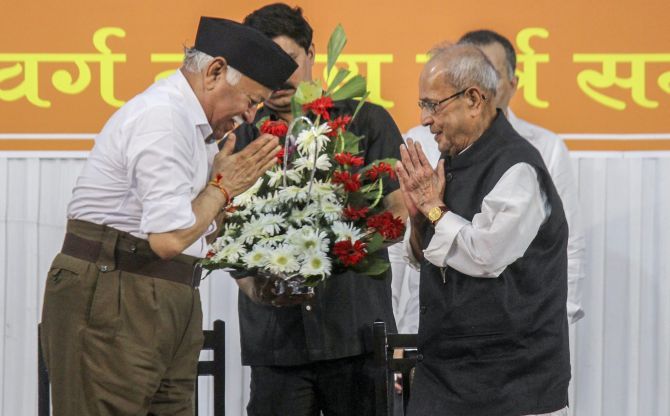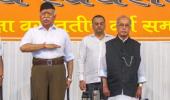'This is the era of images; no speech that Mukherjee could have given could counter the sight of a senior Congressman, elevated by the party to Rashtrapati Bhavan, standing rigidly next to the RSS gerontocracy as those worthies delivered the organisation's faux-fascist salute,' says Mihir Sharma.

I remember once sitting in a room as Pranab Mukherjee, then a Cabinet minister in the United Progressive Alliance, explained his government's plan to conduct a socio-economic caste census.
Many in that room were concerned about the SECC; they variously thought it would solidify caste barriers, or under-count the underprivileged, and so on.
I expected Mukherjee to take on these objections and explain why they were wrong. Instead we were treated to a lengthy explanation of the history of counting caste under the Indian (and British Indian) State, an exposition dripping with facts and anecdotes that Mukherjee produced solely from his extraordinarily capacious memory.
At the end of the discussion, I was left with three conclusions: First, Mukherjee was something of a scholar; second, he would far prefer to avoid direct ideological battles; and, third, that he was not particularly persuasive, unlike most politicians.
When 'Citizen Mukherjee' -- as he calls himself on Twitter -- spoke at the Rashtriya Swayamsevak Sangh's headquarters in Nagpur last week, all three of these conclusions received additional endorsement.
Mukherjee was not untrue to himself; he strove to present a Nehruvian view of history, if in a tone that sought compromise with the RSS' much less inclusive narrative.
He sought also to flatter his listeners; but I suspect he failed to change the minds in the audience, or in the country at large.
What was the ex-President up to? Why did he go?
Mukherjee is unlikely, at this point, to make choices just in order to stay in the headlines.
Unlike other elderly politicians in the past who have flirted with controversy, he has no book to sell at this precise moment.
When I first heard of Mukherjee's speech, I suspected it was part of the general outreach that is widely rumoured as being conducted by the Congress towards the RSS; the attempt being to, at least, ensure that the Sangh is not as active on the ground in favour of the Bharatiya Janata Party in 2014 as it was in 2019.
But the clear exasperation expressed by senior Congress voices ahead of Mukherjee's speech suggests that wasn't it.
I think it is fair to give Mukherjee the benefit of the doubt. He is a politician who has demonstrated throughout his career that he sees politics as a series of negotiations. He was, after all, the UPA's preferred trouble-shooter and coalition-preserver.
By going to the RSS' lair and restating his vision of this country's past and its nationhood, he must have calculated that he was forcing the guardians of India's ruling ideology -- which, of course, is now Hindutva -- to deal with alternative views, and to recognise that they might have to incorporate them in their choices.
It is on this basis, I suppose, that many liberals who believe in the power of argument and discussion above all have applauded Mukherjee's choice.
Yet, even by those terms, Mukherjee undermined his project: Most obviously by his choice to write in the RSS' visitor book that he had come to 'honour' the RSS' founder -- a man who had uncompromisingly illiberal views that have no place in modern India -- as a 'great son of mother India.'
It is true that Keshav Baliram Hedgewar was not, say, an admirer of the Nazis in the manner of his successor. Yet he was clear that Indian Muslims are 'foreign snakes'; and his attitude to Indian nationalism was nothing if not ambiguous, given that he kept the RSS carefully out of the Gandhi-led freedom movement.
The India that Hedgewar is a 'great son' of is not the India that Mukherjee described in his speech.
And in purely political terms, Mukherjee's appearance was a disaster.
I cannot help thinking that Mukherjee has once again shown that he is an awful politician. This is uncontroversial, given his electoral record, but some of us may have forgotten it in the years that he was propped up by the Congress leadership.
This is the era of images; no speech that Mukherjee could have given could counter the sight of a senior Congressman, elevated by the party to Rashtrapati Bhavan, standing rigidly next to the RSS gerontocracy as those worthies delivered the organisation's faux-fascist salute.
For a swayamsevak, the Sarsanghchalak is a greater personage than the President of India; Mukherjee's presence at Nagpur suggested that the Congress agreed at least that they were equals.
As we go into 2019, the Congress' position is insecure. It is less likely than in 2014 that Hindutva, the Sangh, and Narendra D Modi will have a free run for a decade.
Yet any attempt to put the Hindutva genie back in its bottle will require at the very least sustained and determined Opposition to it -- which the Congress needs to show it is capable of leading.
Mukherjee, perhaps in defiance of his party's leadership, perhaps in ignorance, has chosen instead to demonstrate that a Congressman will choose to be weak when he needs to be resolute.
Mukherjee didn't 'troll' the RSS with his speech; he was out-thought and out-politicked by its leaders.










